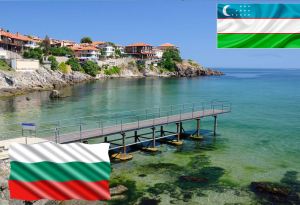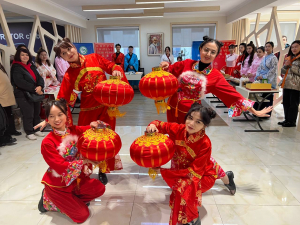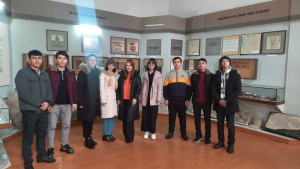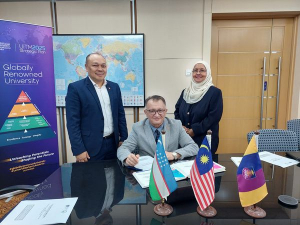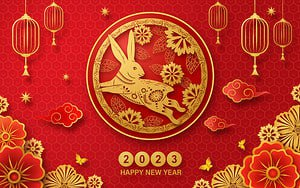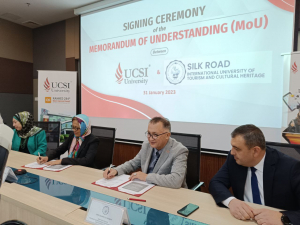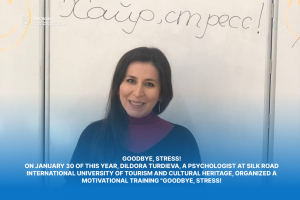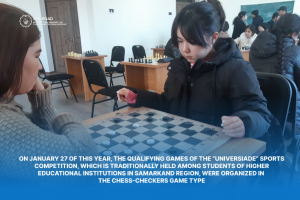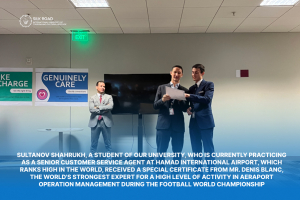Administrator
Dear student! Are you against drugs? Then, participate in our “Youth against drug addiction” campaign and promote a healthy lifestyle!

Friendly championships were organized among students on volleyball, badminton, chess-checkers, swimming, table tennis, and lacrosse sports in the sports action organized by the Sports Club at “Silk Road” International University of Tourism and Cultural Heritage within the framework of the month “Youth against drug addiction”. Sports clubs are organized by the university sports club on the specified days of the week. We call on all our students to be active in sports clubs and engage in a healthy lifestyle!
International Summer internship for university and college students
The Bulgarian company SMART Tour provides an opportunity for students studying in the field of tourism to complete an internship from 3 to 5 months during the summer period of internships and vacations in resorts located on the Black Sea coast of Varna, Bulgaria, which is popular in the hospitality industry!
The following vacancies are offered:
- Administrator (reception)
- Waiter
- Room cleaner
- Bartender (Bartender)
- Assistant for the cook
Students over the age of 18 are accepted for the internship. Students receive free accommodation, meals, transfers and medical insurance. Each student receives a monthly salary. Students undergo internships under the supervision of practice leaders from the Uzbek side. At the end of the internship, each student receives an international certificate. An internship in Bulgaria is a great opportunity to have fun during your summer holidays, meet new friends and also a great opportunity to travel.
The event "Chinese Spring Festival" was organized
On February 2, current year, under the guidance of students of "Silk Road" International University of Tourism and Cultural Heritage and a chinese language teacher of the university Obid Nabiev an event "Chinese Spring Festival" was organized.
During a festive event organized by students of the Silk Road International University of Tourism and Cultural Heritage, Chinese national dances and songs, fragments of national traditions were performed in the assembly hall of the university.
Did you know that Chinese New Year begins on January 22 according to the Chinese calendar? - We know that according to the Chinese calendar, each year has its own interpretation of the animal. New Year in the Chinese lunisolar calendar comes later than in the Gregorian calendar. Of course, the Gregorian calendar is also used in China, but the dates of holidays in China are usually determined according to the Chinese calendar.
Among these holidays is the Chinese New Year, which is also considered the Spring Festival. After it was included in the Gregorian calendar, it began to be called so separately from the New Year in Europe. We know that despite the fact that January 1 is the beginning of the New Year, in many countries the New Year falls in the spring, when nature wakes up from its winter sleep. According to custom, the Chinese New Year coincides with the winter solstice season from the rising of the new moon to the end of the first lunar cycle. According to the Gregorian calendar, Chinese New Year falls between January 21st and February 21st. Since ancient times, the New Year has been the main and longest holiday in China. Chinese New Year is celebrated not only in the Chinese region, but also in Hong Kong, Macau, Taiwan, Brunei and Indonesia, in general, in all places where the Chinese live.
The New Year celebration lasts 2 weeks and ends with the Lantern Festival. Chinese New Year is primarily a family holiday. Although a person has lived alone for many years, he should spend this holiday as much as possible with his parents and family. Before the New Year, large queues for tickets line up at the railway ticket offices in China, so you need to buy tickets in advance. On New Year's Eve, the table will be festive, rich and plentiful.
Chicken, fish and soy cheese are sure to be on the menu, because the names of these ingredients are closely related to the Chinese words for "prosperity" and "happiness." Dumplings are eaten during a holiday in the northern part of the country. In the south, they eat a dish called "nyan gao". This dish is made with glutinous rice flakes that symbolize the improvement of life year after year. Nobody sleeps at night during the Chinese New Year. This ceremony is called "shou sui" - "to save the year."
The Chinese stick red leaves with New Year wishes on the door. In addition, the hieroglyph of happiness is pasted upside down on the door. On the first day of the new year, incense sticks are lit. In the first 5 days of the New Year, they meet with friends, classmates, relatives, colleagues and congratulate them on the holiday, but do not give gifts for the New Year. However, children are given "ya-sui-qiang" - money in special red envelopes. According to an ancient tradition, every child who comes home during the 15 days of the New Year is given money.
1st year students of the “Silk Road” International University of Tourism and Cultural Heritage visited the Samarkand regional museum of local history
Do you want to get acquainted with our past history?
Then take a trip to the museum with us!
On February 2, 2023, 1st year students of the “Silk Road” International University of Tourism and Cultural Heritage visited the Samarkand regional museum of local history.
Students got acquainted with the expositions organized in the museum. Expositions of history, nature and Jews of the region and historical artworks in the museum left a rich impression on the students.
Brief information about the museum!
Samarkand Regional Museum of Local History - Samarkand Regional Museum of Local History is a museum with a historical profile in Samarkand, dedicated to the history of the local region from ancient times to the beginning of the 20th century. Since 1982, it has been part of the Samarkand State United Historical Architecture and Art Museum-Reserve (now the Samarkand State Museum-Reserve).
About the museum building
The museum was opened in December 1981 in a historical building built in the historical style from 1902 to 1916 according to the project of the architect E. O. Nelle, owned by the first guild merchant Abram Kalantaro, based on the collections of the Museum of the History of Culture and Art of Uzbekistan. Five buildings were erected in the courtyard during 1902-1916.
The interior of the building is always of great interest to visitors. Experienced craftsmen - Usta Kamal, Usta Sadiq, Usta Hafiz and others took part in decorating the building. More than 130,000 golden rubles were spent on the construction of the palace. Today, the palace is considered an architectural monument of the beginning of the 20th century and is protected by the state. Brightly colored hall - the hotel, like other rooms, has preserved its original decoration.
Exposures
The museum has expositions of history, nature and Jews of the region.
All the rooms in the building are located in a row and form an enfilade.
The hotel and some rooms have been preserved in their original state. The hotel is beautifully decorated with various colors. The ceiling is decorated with wood carvings and painted with oil paints, the walls are decorated with gesso carvings in the style of “painting”, and colorful glass stained glass windows with gesso railings give a special charm. An elegant, sparkling crystal chandelier hangs in the living room.
In order to heat the building in winter, 7 ceramic “fireplace” stoves with secret decorations were installed, their decorations gave the rooms a special beauty.
On the first floor of the building, objects that tell stories from ancient times to the beginning of the 20th century, found in different regions of our country, are displayed, the unique history of the region, customs and ceremonies of the peoples of the region, primitive culture, the formation of Sogd, one of the oldest states of Central Asia, early, developed and monuments of material culture of the late Middle Ages, introduces traditional national culture.
“Empire” style furniture of the late 18th and early 19th centuries is exhibited in the hotel. According to some experts, the furniture may belong to Emperor Napoleon and was brought to St. Petersburg by Emperor Alexander I and given as a gift to one of the palace officials.
In the natural exposition located on the 2nd floor of the museum, the fauna and flora of the region, including the collections of endangered animals and birds included in the “Red Book”, plant species and herbariums are displayed.
At the moment, the exhibition “Jews of the past and present in the region” organized with the support of the international Joint organization is operating in the museum. The exhibits tell about the history of the Jewish Quarter, the life, customs.
Meeting with the rector of the MARA University of Technology (UiTM) Malaysia
Meeting between Prof. Juliboy Eltazarov, First Vice-Chancellor of "Silk Road" International University of Tourism and Cultural Heritage and Prof. Datuk Dr. Hajah Roziah Mohd Janor, Vice-Chancellor of Universiti Teknologi MARA (UiTM) to discuss plans of expanding cooperation.
"Chinese Spring Festival"
On February 2, 2023, we invite the students and the whole staff of the University to the event prepared for the "Chinese Spring Festival" in cooperation with the students of the "Silk Road" International University of Tourism and Cultural Heritage and the Institute of “Confucius”!!!
During the event you will enjoy:
- Chinese national dance
- Taijiquan (Chinese gymnastics)
- Chinese calligraphy
- Chinese tea ceremony
Chinese national music and some cultural events
A Memorandum of Understanding was signed between the International University of Tourism and Cultural Heritage "Silk Road" and UCSI International University of Malaysia
As part of a visit to Malaysia, a delegation from Samarkand region, accompanied by Uzbek Ambassador to Malaysia R. Usmanov visited UCSI International University, one of the top 300 universities in the world according to QS rating.
In his speech, Ravshan Usmanov highlighted the work undertaken by the government and universities of Uzbekistan in cooperation with educational institutions of developed countries.
UCSI Rector Hamisah Binti Tapsir warmly welcomed the delegation and expressed willingness to sign a memorandum of understanding.
J. Eltazarov, First Vice Rector of Silk Road International University of Tourism and Cultural Heritage made a presentation on the international university.
Deputy Khokim of the region R.Kobilov proposed to establish a branch of UCSI International University in Samarkand.
Based on the proposals, a Memorandum of Understanding was signed between the International University of Tourism and Cultural Heritage "Silk Road" and UCSI International University.
Goodbye, Stress!
On January 30 of this year, Dildora Turdieva, a psychologist at Silk Road International University of Tourism and Cultural Heritage, organized a motivational training "Goodbye, Stress!
The interesting event was devoted to positive (yes, don't be surprised!) aspects of stress, which has become an integral part of modern life, and ways to get rid of it. Relaxation exercises and proper breathing exercises were excellent ways to relieve internal tension and bring balance and peace of mind. During the training, role and movement games were organized to improve relationships in the group, creating a healthy competitive environment and giving all participants a positive mood. The psychodiagnostic method "Shield" revealed each person's mental state and helped in the psychological correction of emotional and emotional disorders and feelings of guilt.
Labour productivity depends, first of all, on a person's emotional state. Mental well-being leads a person to a happy, healthy and prosperous life. This was the goal of the motivational training conducted by Dildora Turdieva.
On January 27 of this year, the qualifying games of the “Universiade” sports competition, which is traditionally held among students of higher educational institutions in Samarkand region, were organized in the chess-checkers game type
On January 27 of this year, the qualifying games of the “Universiade” sports competition, which is traditionally held among students of higher educational institutions in Samarkand region, were organized in the chess-checkers game type.
Two of our students took part in the competition. 4th grade student Kadirova Onajon, who defended the honor of the university in checkers girls’ competition, took 3rd place, and in boys’ chess competitions, 3rd grade student of our university Yuldoshev Shahriddin took 3rd place.
Sultanov Shahrukh, a student of our university, who is currently practicing as a Senior Customer Service Agent at Hamad International Airport, which ranks high in the world, received a special certificate from Mr. Denis Blanc, the world's strongest expert for a high level of activity in aeraport Operation Management during the football world championship.
The important aspect of this certificate is that it reflects the experience at the airport, which is the most important link during the most famous competition in the world, and serves as a very important basis for our student's future activities.
New on the website
-
On March 26, an open lesson organized by Nilufar Rakhimova, a teacher at the Tourism department of the International University of Tourism and Cultural Heritage "Silk Road," was held. During the lesson, master's students studying in the management direction of the university presented their startup projects.
Written on Thursday, 27 March 2025 12:28
-
On March 26,the Department of Scientific Research of the “Silk Road’’ International University of Tourism and Cultural Heritage organized a presentation of students’ startup projects. As part of this presentation, university youth presented their projects to the audience.
Written on Wednesday, 26 March 2025 17:39
Contacts
Samarkand city, Republic of Uzbekistan, 140104, 17, University boulevard.
-
dummy+99866 240-67-68
-
dummy info@univ-silkroad.uz

